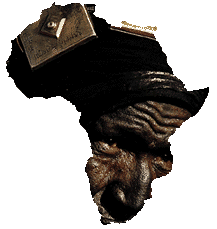
|

 I saw Tuareg for the first time on the way down I saw Tuareg for the first time on the way down
 from Tamanrasset. I was riding with an oil trucker from Tamanrasset. I was riding with an oil trucker
 named Kerroumi who had picked me up hitchhiking named Kerroumi who had picked me up hitchhiking
 outside the city, and as we passed through a 400- outside the city, and as we passed through a 400-
 mile stretch of brutal desert (average daytime mile stretch of brutal desert (average daytime
 temperature: 110 degrees Fahrenheit), it became temperature: 110 degrees Fahrenheit), it became
 harder and harder to imagine human beings living harder and harder to imagine human beings living
 in this environment. Sand all around, for literally in this environment. Sand all around, for literally
 thousands of miles. And sand. And sand. Not sand thousands of miles. And sand. And sand. Not sand
 dunes, but flat, hard sand with little sprigs of dunes, but flat, hard sand with little sprigs of
 withered grass and, here and there, a scrubby tree. withered grass and, here and there, a scrubby tree.
 Occasionally, there might be some patches of vines Occasionally, there might be some patches of vines
 with inedible melons, and sometimes there'd be an with inedible melons, and sometimes there'd be an
 oued (dry river valley) lined with shrubs. But oued (dry river valley) lined with shrubs. But
 mostly there was just sand. We'd go for hours mostly there was just sand. We'd go for hours
 without seeing any signs of human life. And then without seeing any signs of human life. And then
 the Tuareg would appear, like ghosts. the Tuareg would appear, like ghosts.

 Whenever we stopped to rest for any length of time, Whenever we stopped to rest for any length of time,
 they'd show up. Evidently they could hear the truck they'd show up. Evidently they could hear the truck
 from miles away and would come, I guess, to watch from miles away and would come, I guess, to watch
 us. On a route with so few cars, we must've been a us. On a route with so few cars, we must've been a
 big event. Or maybe they were coming to see if we big event. Or maybe they were coming to see if we
 were in trouble, in which case, if we had anything were in trouble, in which case, if we had anything
 valuable to offer, they would have provided valuable to offer, they would have provided
 assistance. assistance.

 They'd never say anything. They'd just stand there, They'd never say anything. They'd just stand there,
 about twenty yards away, tall, erect, otherworldly, about twenty yards away, tall, erect, otherworldly,
 and regal, like mirages in the shimmering, overheated and regal, like mirages in the shimmering, overheated
 air. air.

 The children had mohawks or a single tuft of hair The children had mohawks or a single tuft of hair
 standing straight up. The grownups carried walking standing straight up. The grownups carried walking
 sticks and were covered up by indigo veils and sticks and were covered up by indigo veils and
 turbans. People call them "les hommes bleus," or turbans. People call them "les hommes bleus," or
 "the Blue Men," Kerroumi told me. This is because "the Blue Men," Kerroumi told me. This is because
 the indigo dye they use for their veils stains the indigo dye they use for their veils stains
 their pores, giving their skin a weird, permanently their pores, giving their skin a weird, permanently
 purple cast. Evidently, they've been out here in the purple cast. Evidently, they've been out here in the
 desert since around the time people quit being monkeys. desert since around the time people quit being monkeys.

 At one time, back in the Middle Ages, they lived At one time, back in the Middle Ages, they lived
 like royalty. They became wealthy mining and selling like royalty. They became wealthy mining and selling
 then-precious salt from the desert. Since they were then-precious salt from the desert. Since they were
 the first and only people to colonize this huge the first and only people to colonize this huge
 territory, they could control (and tax) all overland territory, they could control (and tax) all overland
 trade between Europe and the rich kingdoms of West trade between Europe and the rich kingdoms of West
 Africa. They even had their own private slave tribe, Africa. They even had their own private slave tribe,
 the Bella. the Bella.

 But now, there's no more desert trade, salt isn't so But now, there's no more desert trade, salt isn't so
 precious anymore and recently, in the last few precious anymore and recently, in the last few
 generations, the Bella have abandoned them. For generations, the Bella have abandoned them. For
 fifteen years there's been a serious drought: annual fifteen years there's been a serious drought: annual
 rainfall has been under five inches. There's nothing rainfall has been under five inches. There's nothing
 for the goats to graze upon. It's hard to imagine for the goats to graze upon. It's hard to imagine
 what these Tuareg live on, much less what they're what these Tuareg live on, much less what they're
 doing with a pickup truck. doing with a pickup truck.

|

